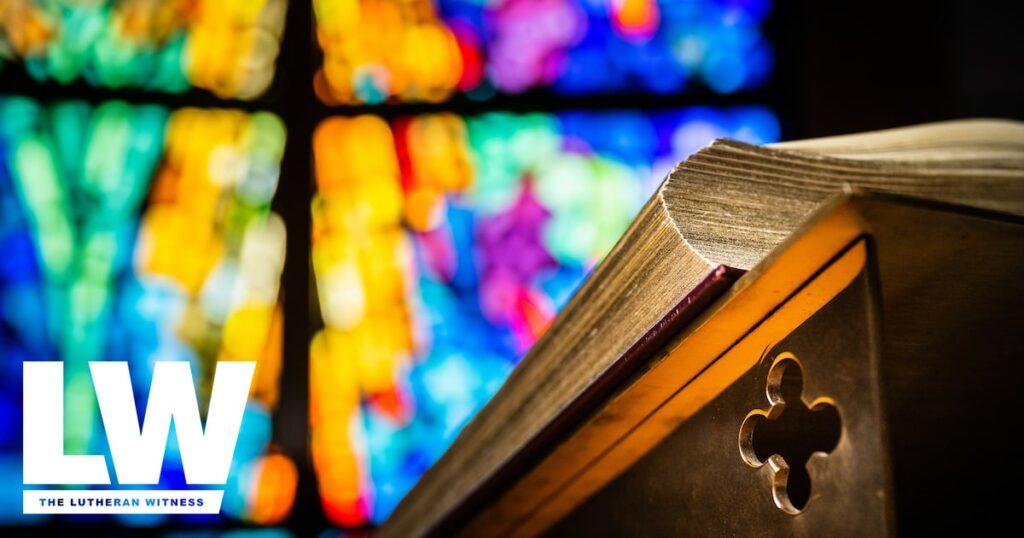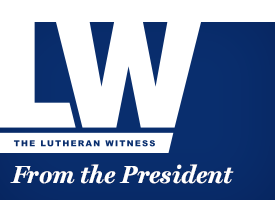by Matthew C. Harrison
Dr. C.F.W. Walther traveled to the first convention of the Iowa District of the Synod in 1879. While on the train, he was — like most pastors — involved with other passengers in a conversation about Christ. At a stop to change trains, he hopped off, forgetting his briefcase which contained his very famous essay, “The Duties of an Evangelical Lutheran Synod.” Luckily someone noticed and scrambled to get his case to him. Fortunate for us.
He began his essay saying to those gathered, “Although we Christians may know what is right, yet because we are still in our sinful flesh, we always need to be reminded of our duties, need to be warned and admonished again and again. After all, that is what the holy apostle does, even with those congregations whom he praises the most. He keeps right on working with his congregations and keeps reminding them of what they already know. He wants this knowledge to be a fresh and living reality in their minds. And so I thought this would also be good for the dear brethren of this district.”
In light of the Synod’s 175th anniversary, I want to direct you to the theses Walther presented that day. They explain a lot about what the Missouri Synod is to this very day. For the full essay with all of Dr. Walther’s biblical quotations and much more, see At Home in the House of My Fathers (St. Louis: Concordia Publishing House, 2010), 224–330. Ask your pastor to walk through Walther’s theses with your congregation. You’ll better understand the Synod and appreciate its strengths and blessings.
–Pastor Matthew C. Harrison
First Iowa District Convention
St. Paul’s Church
Fort Dodge, Iowa
Beginning August 20, 1879
The most honorable Dr. C.F.W. Walther had prepared the essay and had presented theses “On the Primary Duties Incumbent on a Synod That Wants Rightly to Be Considered an Evangelical Lutheran Synod.”
Thesis I
Its primary duty is to be faithful to the Confessions in word and deed, and therefore it must
a) without reservation confess the creeds of the Evangelical Lutheran Church;
b) accept only pastors, teachers, and congregations that are faithful to the [Lutheran] Confessions;
c) supervise the confessional faithfulness of its members;
d) practice fellowship only with Church bodies that are faithful to the Confessions.
Thesis II
A second major duty is that it faithfully treat its congregations in an evangelical way, and therefore
a) not assume a dictatorial role over them, but only help them in an advisory way;
b) assist them in acquiring upright [rechtschaffener] pastors and teachers;
c) protect them against pastors who err in doctrine, follow an offensive lifestyle, and are domineering in their office.
Thesis III
A third major duty is that it support its pastors and teachers, and therefore
a) counsel them;
b) support them in the proper conduct of their office;
c) defend them against unjust treatment.
Thesis IV
A fourth major duty is that it promote the growth of its members in the knowledge of the truth in every way possible, and therefore
a) give priority to doctrinal discussions in arranging its conventions/conferences;
b) arrange for both pastoral and teacher conferences, review their minutes, and evaluate them;
c) make every effort to disseminate good literature.
Thesis V
A fifth major duty is that it strive for peace and unity in the truth in its midst, and therefore see to it
a) that all members are mutually submissive;
b) that each bear the other’s burden in brotherly love;
c) that no unnecessary disputes arise and are continued, whether they have to do with doctrine or practice.
Thesis VI
A sixth major duty is that it not seek its own glory but only the glory of God, being intent not so much on its own growth but rather on the growth of Christ’s kingdom and the salvation of souls, and therefore
a) not employ dishonest means, but above all, be intent on using the Gospel in all its purity and fullness to win souls and keep them;
b) seek to produce in its members not so much zeal for its particular community, but rather living faith, unfeigned love, and genuine godliness;
c) take an enthusiastic and, as much as possible, active part in all God-pleasing organizations dedicated to the spread of Christ’s Kingdom in the world.





